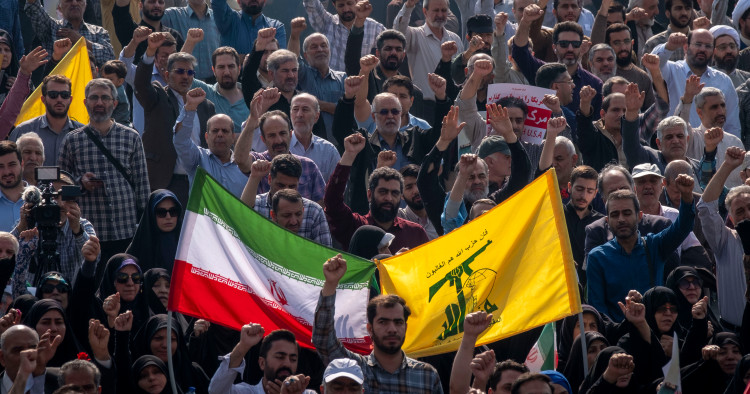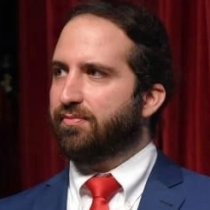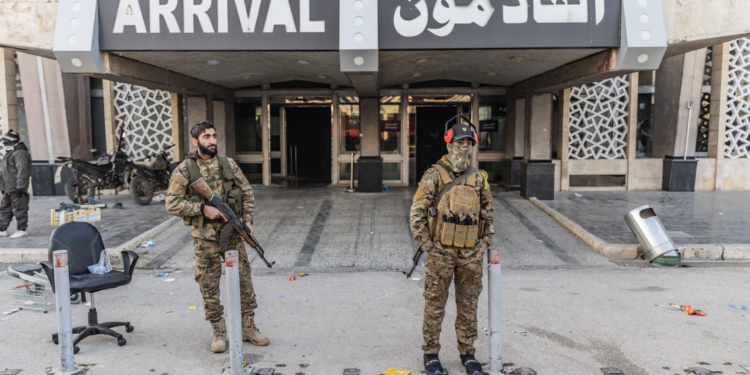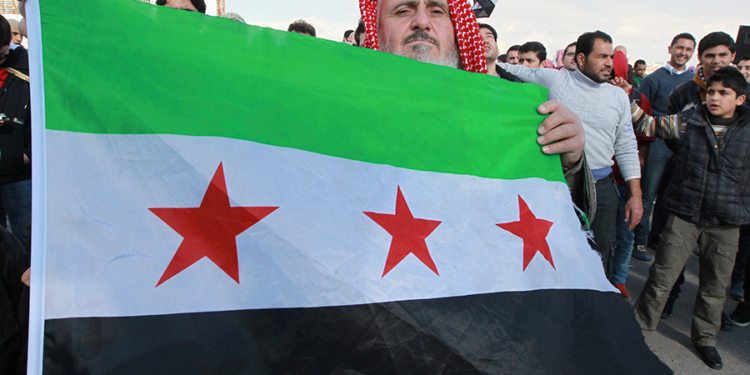
Contents:
- Iran’s growing burden of confronting Israel
- Israel and the US should act in concert on Iran
- Who speaks for Lebanon?
- The burgeoning threat of a regional conflict pushes GCC states and Iran closer together
- The Catch-22s of US Middle East policy start to add up
- Nudging the status quo in the Horn of Africa
Iran’s growing burden of confronting Israel
Alex Vatanka
Director of Iran Program and Senior Fellow, Black Sea Program

What Tehran ends up doing — whether continuing to prioritize the fight against Israel or looking for ways to deprioritize it as a national security matter — will not be settled in the foreseeable future.
Without any pledges of support from regional neighbors, Iran is on its own and will focus on its preexisting two-pronged strategy: to avoid direct war with Israel on the one hand but to push for Israel’s delegitimization on the international stage whenever feasible on the other.
Iranian media headlines from last week vividly demonstrated the hard choices before Tehran as Iran confronts the specter of possible war with Israel and its allies. The contrasting realities exemplify the pressures Iran’s leadership is under in terms of choosing the immediate and narrow national security interests, namely focusing on saving the economy and avoiding war, versus insisting on core Khomeinist convictions of confronting Israel and the United States.
One official in Tehran said last week that Iran “needs $200 billion of investment by 2031 to achieve its economic goals,” a rather restrained admission that the national economy is in dire straits. At the same time, other Iranian officials are preoccupied with signaling to Iran’s Arab neighbors to refrain from aiding the Americans or the Israelis in any military operations against Iran or face Iranian retaliation. The wealthy Gulf states, which otherwise could be a major source of badly needed investment in Iran, are instead today only focused on not becoming a battleground in any Iranian-Israeli hot war.
Authorities and regime-friendly elites in Tehran are putting in extra effort to make the case that the conflict with Israel is not an ideological decision but an unavoidable conflict of national interest. As former Minister of Interior and Justice Mostafa Pour-Mohammadi put it, “Israel’s existence is against [Iran’s] national interest and independence,” further noting that the ongoing Iranian-Israeli conflict is not determined by what the Palestinian people choose for their future. This all sounds very dark, and it is highly unlikely that such incendiary remarks help bring the Islamic Republic regime closer to an already politically and economically struggling Iranian public that regards the high-stakes clash with Israel as one forced upon the nation by the Islamist ruling class.
What Tehran ends up doing — whether continuing to prioritize the fight against Israel or looking for ways to deprioritize it as a national security matter — will not be settled in the foreseeable future. For now, Iran’s leadership will focus on its preexisting two-pronged strategy: to avoid direct war with Israel on the one hand but to push for Israel’s delegitimization on the international stage whenever feasible on the other. Second, Tehran wants to preserve as much of Hezbollah’s and Hamas’ fighting capacities as possible. This agenda was plainly evident during Foreign Minister Abbas Araghchi’s regional tour last week.
The word in Tehran is that Araghchi managed to convince Iran’s Arab proxy allies, such as Hezbollah, that Iran is not about to retreat in the region. But there is no evidence that he secured any meaningful support from Arab countries in Iran’s ongoing conflict with Israel. On that front, all Arab states are willing to undertake is to vow that that they will not actively support Israeli or American strikes against Iran. In other words, Iran is on its own. One must wonder if the growing burden of fighting this lone struggle will give Tehran reason to look for a change of course on the question of the Israeli-Palestinian conflict.
Follow: @AlexVatanka
Israel and the US should act in concert on Iran
Yoel Guzansky
Non-Resident Scholar

If Israel assesses with high confidence that it can, independently, completely take out Iran’s nuclear program, it is in its interest to act despite American opposition because the Iranian nuclear program poses the greatest threat to the country and Israeli leaders have declared they will not tolerate it.
However, it is doubtful whether Israel currently has the necessary capability to dismantle the entire program on its own, and it is only by minimizing their differences and acting in concert that Israel and the United States can send the right deterrent message to the Iranian regime.
In the wake of the latest Iranian missile attack on Israel, on Oct. 1 — wherein it fired 180 missiles, most of which were intercepted — the Israeli side has been issuing stern warnings to Tehran even as it carefully considers its next steps. After the last such direct attack, in April — when Iran launched hundreds of missiles and drones at Israel — Israel’s response was precise but clearly failed as a deterrent. As a result, there is seemingly growing consensus inside Israel that this time it must respond forcefully.
Israel’s restraint in April and its current hesitation stem, first, from heavy American pressure to limit its response so as to avoid a strong Iranian retaliation that could lead to a wider regional conflict. Second, Israel remains focused on more immediate enemies, Hamas and Hezbollah, with its military campaigns against those groups seeking to change the security reality along its borders. Opening another front, this time against a regional power, would hinder Israel’s ability to concentrate its efforts in the current battlefields. Moreover, Tehran is threatening its Arab neighbors that it will attack their oil facilities if the Israeli military strikes Iranian energy assets. Iran is aware of its own vulnerabilities and, as usual, seeks to intimidate its weaker neighbors as a deterrent measure.
Israel maintains good relations with the United Arab Emirates and Bahrain, relationships that have continued despite the war, and is interested in moving forward with a normalization agreement with Saudi Arabia. Attacking Iran’s oil facilities would send a clear deterrent message to Iran but would very likely lead to regional escalation and damage Israel’s relations with the Gulf states, which hope to sit out the conflict and not have to choose sides, to avoid harm.
Israel’s most critical target would be Iran’s advanced nuclear program, which poses the greatest threat not only to Israel but also to the wider region. However, even here, American opposition remains firm. A military strike on nuclear facilities is far more complex than targeting oil installations. Israel would need American support, diplomatically but especially militarily, to inflict severe damage on Iran.
If Israel assesses with high confidence that it can, independently, fully take out Iran’s nuclear program, it would be in its best interest to act despite American opposition. Iran’s nuclear program is the greatest threat facing Israel, and all Israeli leaders in the past two decades have declared that they will not tolerate it. However, a military strike that fails to neutralize the nuclear program could backfire and push Iran to sprint toward a nuclear weapon breakout point. It is doubtful whether Israel currently has the necessary capability to dismantle the entire program on its own; and in any case, it would first have to consult its most important ally. Only by minimizing their differences and acting in concert, can Israel and the United States send the right message to the Iranian regime.
Follow: @YGuzansky
Who speaks for Lebanon?
Fadi Nicholas Nassar
U.S.-Lebanon Fellow

Around a million people have been uprooted from their homes, either displaced internally or forced to seek refuge abroad, and Lebanon’s already dire humanitarian crisis is only likely to worsen as the conflict intensifies.
The Lebanese are coalescing around a fragile but clear consensus: They do not want this war and are instead rallying around a vision of a future rooted in genuine sovereignty and self-determination; this potential can only be realized through strong backing from the United States and its allies for a political solution that decisively ends this war.
Lebanon stands on the edge of oblivion, in a fog of uncertainty that strips its people of the power to make the simplest yet most profound decision: to end this war. While their country’s survival hangs in the balance, they are mere spectators to the fate that unfolds around them.
Around a million people have been uprooted from their homes, either displaced internally or forced to seek refuge abroad, while Israeli evacuation orders cover a quarter of Lebanon’s territory.
Amid this tragedy, Lebanon’s caretaker government cannot manage even a single week of conflict.
This war has shattered many myths, none more lethal than the persistent mindset that has defined US policy toward Lebanon for decades. For too long, Washington ignored the warning signs: Lebanon’s corrupt political class, beholden to Hezbollah, is not merely a failed institution that can be contained; it is a ticking time bomb, ready to take the country and the region with it.
That bomb has now exploded and Lebanon’s already dire humanitarian crisis will only worsen as the conflict intensifies. Lebanon cannot afford this war. After five years of economic collapse, the economy is in ruins and new risks will emerge with each passing day: social implosion, heightened food insecurity, escalating poverty, and the disintegration of law and order.
While it may seem that the voices of the Lebanese go unheard on the world stage, it is the Lebanese people who step into the gaping void left by a state that exists only in name. It is their relentless determination to endure and rebuild that should put an end to every conversation in Washington that shamelessly asks, “Does Lebanon matter?”
These are the voices silenced when US Secretary of State Antony Blinken speaks at length to Nabih Berri, the speaker of parliament and an embodiment of Lebanon’s failed political class. By legitimizing Berri, Hezbollah’s chief political ally, the US actively fortifies a regime that has betrayed the Lebanese people and coerced the state into failure. This is a perilous endorsement of a political system that places Hezbollah’s survival above Lebanon’s future and directly undermines US interests.
Washington needs to truly grasp the new reality unfolding before it. The post-2006 playbook lies in ruins. Now is the moment for real change, for ideas that can ignite transformation, and Washington has a narrow window to take action. The Lebanese are coalescing around a fragile but clear consensus: They do not want this war. The vast majority of them categorically reject Israel’s invasion and oppose Iran’s role in imposing this war. Instead, the Lebanese are rallying around a vision of a future rooted in genuine sovereignty and self-determination.
This moment demands a recalibration of US policy that centers the voices of the Lebanese people and ensures their demand for a credible state takes precedence in diplomatic efforts. By embracing this approach, the US can transition from a reactive posture to one that actively empowers Lebanon to reclaim its future.
Charting a political alternative to war is not easy; it necessitates the full withdrawal of Israeli forces, a commitment to Lebanon’s sovereignty, the peaceful disarmament of Hezbollah, and the restoration of the state’s control over its entire territory. Yet this alternative, while challenging, is infinitely more viable than the relentless cycle of violence that war brings. And Washington does not have to do it alone. Decades of US support for the Lebanese Armed Forces (LAF), coupled with the broad trust they enjoy among the Lebanese people, positions them to play a key role in facilitating a peaceful transition. However, this potential can only be realized through strong backing from the US and its allies for a political solution that decisively ends this war. With this support, the LAF can lead a locally embraced process that empowers the people to reclaim their sovereignty and build a future grounded in lasting security and dignity.
Follow: @dr_nickfn
The burgeoning threat of a regional conflict pushes GCC states and Iran closer together
Gerald M. Feierstein
Director, Arabian Peninsula Affairs Program, and Distinguished Sr. Fellow on US Diplomacy

Iran’s diplomatic outreach to the Gulf states has gone into overdrive in recent weeks as Tehran seeks to neutralize any further alignment of the Gulf states with the US and Israel as part of an anti-Iran coalition.
This Iranian push builds on a longer-term effort since 2019 to normalize relations with its Gulf neighbors and reduce tensions in the region, as the Gulf states seek to focus on pressing domestic economic and social challenges.
The growing threat of a direct conflict with Israel has pushed Iran into diplomatic overdrive with its Gulf Cooperation Council (GCC) neighbors. Following a meeting on the sidelines of the UN General Assembly in September with GCC Secretary-General Jasem al-Budaiwi, Iranian Foreign Minister Abbas Araghchi met with all six of the GCC foreign ministers in Doha in early October. A week later, Araghchi traveled to Riyadh for meetings, including with Saudi Crown Prince Mohammed bin Salman.
Following the Iranian missile strike on Israel in April, in which Arab states cooperated with Israel and the United States in blunting the effects of the attack, Araghchi’s mission was clearly aimed at neutralizing any further alignment of the Gulf states in an anti-Iran coalition with its principal adversaries. The mission assumed greater urgency after Iran launched a second missile and drone attack on Israel in response to the assassination of Lebanese Hezbollah chief Hassan Nasrallah and Israel’s vow to retaliate against Iran directly.
Iran’s diplomacy builds on efforts underway since 2019 to normalize relations with its Gulf neighbors and reduce tensions in the region. These efforts have resulted in renewed relations between Tehran and five of the six GCC states — Bahrain being the sole exception — and mutual assurances of a desire to address differences through dialogue and negotiation. For the Gulf states as well, the opening to Iran has brought a welcome respite from the threat of a potentially devastating conflict, exacerbated by a lack of confidence in US security assurances, and an opportunity to focus on pressing domestic economic and social challenges.
As the risk of an all-out Israel-Iran confrontation grows, potentially drawing in the US, Araghchi’s diplomatic mission appears to have achieved its basic objective. In its statement issued after the meeting with Araghchi, the GCC Secretariat noted that the two sides “addressed the escalating tensions in the region and their serious implications for both regional and international peace and security. The GCC reaffirmed during the meeting the importance of de-escalation, exercising the utmost restraint, and preventing further instability and the threats posed by wars and destruction, along with their impact on the peoples of the region and the world.” In a potential warning to Israel as it contemplates its threatened retaliation, a Reuters report on the GCC-Iran meeting noted that the GCC states “sought to reassure Iran of their neutrality regarding the Iran-Israel conflict.”
The Catch-22s of US Middle East policy start to add up
Brian Katulis
Senior Fellow for US Foreign Policy

The United States continues to work hard behind the scenes to prevent a regional war and remain in alignment with key regional partners.
But with about three months left in office, the Biden administration faces some fundamental dilemmas in navigating the region given its strategy.
The Biden administration continues to work feverishly behind the scenes to stop a war that has already gone regional and to keep Israel and the United States in strategic alignment as Israeli-Iranian tensions reach a critical point. Much of the discussions between the US and Israel are focused on the latter’s planned retaliation against Iran for its recent attacks, with President Joe Biden and Israeli Prime Minister Benjamin Netanyahu talking through the next steps in a call last week.
With three weeks until America’s election and about three months left in Biden’s term, the US is starting to face some fundamental dilemmas inherent in its policy approach to the Middle East over the past year, since Hamas started this war by attacking Israel on Oct. 7, 2023. The Catch-22s — the difficult circumstances of competing policy priorities that are at times mutually conflicting or in tension — have started to add up. Three dilemmas that US Middle East policy faces in the coming weeks include: 1) how to back Israel’s right to self-defense while preventing the increasingly regional war from further expanding; 2) how to support defeating terrorist groups like Hamas and Hezbollah while ensuring the protection of civilian populations and distribution of aid to innocent people affected by the conflict; and 3) how to deepen US engagement in the Middle East while balancing the important roles it plays in offering strategic support to partners in Asia and Europe.
On the first point, the Biden administration has offered strong support to Israel’s self-defense over the past year, even when it found itself at odds with the tactics Israel used in the Gaza Strip and even when it was caught off guard by Israeli attacks in Lebanon, Syria, and Iran that could have produced blowback for US troops in the region.
Inside the Pentagon, defense officials and military analysts have been quietly debating whether the United States is preventing or inflaming a wider conflict by sending more troops, weapons, and military hardware to the region at a time of such uncertainty. The Biden administration is seeking to continue a “Goldilocks” approach for its security engagement, one that tries to strike the right balance between not too hard or too much and not too soft or too little in its actions.
When it comes to the stated US policy goals of supporting the military defeat of groups like Hamas and Hezbollah, this objective has been at odds with efforts to protect innocent civilians and deliver much-needed humanitarian aid for the past year. On balance, the US has leaned toward supporting counterterrorism measures employed by Israel and other Middle East partners over civilian protection and humanitarian aid delivery. As a result, the US record in advancing the policy priority of helping keep people safe is quite poor, as this author’s latest assessment of US regional policy, “Strategic Drift,” demonstrates. Without a clear definition of “victory” and an end state, the risk is growing that current conflicts in the region might become prolonged.
The Biden administration’s final strategic dilemma has been between engaging more deeply in the Middle East versus in Asia and Europe. China conducted war games around Taiwan this past weekend, and Russia’s ongoing war against Ukraine has not quieted down. These other theaters also demand time, military resources, and diplomatic attention from the United States at a time when the Middle East faces looming challenges.
A report released this summer by the Commission on the National Defense Strategy highlighted how the United States remains unprepared and lacks sufficient resources to meet the global goals set by its national security and defense strategies.
This means that the Biden administration will have to focus much of its last three months in office on juggling multiple priorities across the world and addressing several dilemmas present in its Middle East approach. An administration that came into office in 2021 de-prioritizing the Middle East in its overall agenda now is finding that it will likely spend much more time than it had hoped or planned for to address this region in its closing months.
Follow: @Katulis
Nudging the status quo in the Horn of Africa
Mirette F. Mabrouk
Senior Fellow and Founding Director of the Egypt and the Horn of Africa Program

Last week’s meeting between the leaders of Eritrea, Egypt, and Somalia was something of a feather in the cap of an Egyptian government that has been working on improving and consolidating African ties for over a decade.
Though geostrategically important, the Horn of Africa has never attracted the attention it merits from US policymakers.
The visit had been quietly percolating for months. Eritrean President Isaias Afwerki hosted his counterparts, Egyptian President Abdel-Fattah el-Sisi and Somali President Hassan Sheikh Mohamud, in the Eritrean capital of Asmara.
Tensions in the Horn of Africa, already aggravated by the war in Sudan, were ratcheted up in January by an agreement between landlocked Ethiopia and the breakaway republic of Somaliland, which agreed to lease 20 kilometers of its coastline to the former for 50 years in return for it recognizing Somaliland — the only country in the world to do so.
Ethiopia’s president, Abiy Ahmed, had been voicing the need for a port, saying the “the Red Sea was Ethiopia’s natural boundary.”
The closest option was Assab, inconveniently located in Eritrea, forcing Ethiopia to channel its trade through Djibouti. Reports quoted Ahmed as telling a meeting of business leaders that “we want to get a port by peaceful means. But if that fails we will use force.”
“Force” would imply war, Ahmed’s fourth in five years.
Tensions continued to boil amid Ethiopian anger and unease at a recent military agreement between Egypt and Somalia that saw Cairo sending military shipments to Mogadishu, right on its doorstep.
More international visits followed, including that of Eritrean Foreign Minister Osman Saleh to Cairo in August, Egyptian Intelligence chief Abbas Kamel and Foreign Minister Badr Abdelatty to Asmara last month, and finally all three heads of state to the Eritrean capital.
According to a joint statement issued last week, the meeting covered increasing diplomatic and developmental ties, the civil war in Sudan, Somalia’s battle against al-Shabaab terrorists, and security cooperation in the Red Sea. Earlier, a spokesperson had said the leaders “explored different means of boosting bilateral relations in a number of sectors in addition to discussing the current situation in the Horn of Africa and how to bring peace and security to it.”
The meeting was something of feather in the cap of an Egyptian government that has been working on improving and consolidating African ties — an area earlier governments were arguably less concerned with — for over a decade. The Horn of Africa, in particular, with its Red Sea access and potential to enhance or disrupt maritime shipping, is vital to Egypt. It is, however, a region with a complex and delicate balance of power. Both Somalia and Eritrea currently have testy relations with Ethiopia. Eritrea, in particular, has a long and complicated relationship with its neighbor, from which it gained independence in the early 1990s. After decades of war, a truce between them eased tensions and handed Abiy a Nobel Peace Prize. However, detractors of the truce said that Abiy had merely halted one conflict so that he could start another against a mutual enemy, the Ethiopian Tigray. And indeed, in November 2020, the Ethiopian government attacked forces in Northern Tigray, plunging the country into two years of civil war. A peace treaty in 2022 allegedly angered Eritrea because it left intact the Tigray People’s Liberation Front, viewed as a direct threat by Eritrea.
Egypt has its own troubles with Ethiopia over the operation of the Grand Ethiopian Renaissance Dam. Cairo fears the dam will cut off its supply of water from the Nile, on which it relies for about 95% of its needs. Over a decade of fruitless negotiations died a slow death last year, when Egypt and Sudan gave up trying to get Ethiopia to agree to either of their two demands: a legally binding agreement for the operation of the dam or international arbitration.
The three countries that met last week in Asmara have a history of strong diplomatic ties; Egypt and Eritrea have maintained solid relations since the latter’s independence in 1993, and Egypt has had a cultural, educational, and developmental presence in Somalia since the 1950s. The new closeness, however, could change the power balance in the Horn.
All eyes are on the carnage in the Middle East at the moment, but the Horn has never attracted the attention it merits from US policymakers — an astonishing oversight considering, among other factors, its strategically important geopolitical location and key role in the Red Sea’s handling of global trade. Compounding that oversight with a lack of attention to shifting dynamics would be another mistake.
Follow: @mmabrouk
Photo by Morteza Nikoubazl/NurPhoto via Getty Images
The Middle East Institute (MEI) is an independent, non-partisan, non-for-profit, educational organization. It does not engage in advocacy and its scholars’ opinions are their own. MEI welcomes financial donations, but retains sole editorial control over its work and its publications reflect only the authors’ views. For a listing of MEI donors, please click here.

Contents:
- Iran’s growing burden of confronting Israel
- Israel and the US should act in concert on Iran
- Who speaks for Lebanon?
- The burgeoning threat of a regional conflict pushes GCC states and Iran closer together
- The Catch-22s of US Middle East policy start to add up
- Nudging the status quo in the Horn of Africa
Iran’s growing burden of confronting Israel
Alex Vatanka
Director of Iran Program and Senior Fellow, Black Sea Program

What Tehran ends up doing — whether continuing to prioritize the fight against Israel or looking for ways to deprioritize it as a national security matter — will not be settled in the foreseeable future.
Without any pledges of support from regional neighbors, Iran is on its own and will focus on its preexisting two-pronged strategy: to avoid direct war with Israel on the one hand but to push for Israel’s delegitimization on the international stage whenever feasible on the other.
Iranian media headlines from last week vividly demonstrated the hard choices before Tehran as Iran confronts the specter of possible war with Israel and its allies. The contrasting realities exemplify the pressures Iran’s leadership is under in terms of choosing the immediate and narrow national security interests, namely focusing on saving the economy and avoiding war, versus insisting on core Khomeinist convictions of confronting Israel and the United States.
One official in Tehran said last week that Iran “needs $200 billion of investment by 2031 to achieve its economic goals,” a rather restrained admission that the national economy is in dire straits. At the same time, other Iranian officials are preoccupied with signaling to Iran’s Arab neighbors to refrain from aiding the Americans or the Israelis in any military operations against Iran or face Iranian retaliation. The wealthy Gulf states, which otherwise could be a major source of badly needed investment in Iran, are instead today only focused on not becoming a battleground in any Iranian-Israeli hot war.
Authorities and regime-friendly elites in Tehran are putting in extra effort to make the case that the conflict with Israel is not an ideological decision but an unavoidable conflict of national interest. As former Minister of Interior and Justice Mostafa Pour-Mohammadi put it, “Israel’s existence is against [Iran’s] national interest and independence,” further noting that the ongoing Iranian-Israeli conflict is not determined by what the Palestinian people choose for their future. This all sounds very dark, and it is highly unlikely that such incendiary remarks help bring the Islamic Republic regime closer to an already politically and economically struggling Iranian public that regards the high-stakes clash with Israel as one forced upon the nation by the Islamist ruling class.
What Tehran ends up doing — whether continuing to prioritize the fight against Israel or looking for ways to deprioritize it as a national security matter — will not be settled in the foreseeable future. For now, Iran’s leadership will focus on its preexisting two-pronged strategy: to avoid direct war with Israel on the one hand but to push for Israel’s delegitimization on the international stage whenever feasible on the other. Second, Tehran wants to preserve as much of Hezbollah’s and Hamas’ fighting capacities as possible. This agenda was plainly evident during Foreign Minister Abbas Araghchi’s regional tour last week.
The word in Tehran is that Araghchi managed to convince Iran’s Arab proxy allies, such as Hezbollah, that Iran is not about to retreat in the region. But there is no evidence that he secured any meaningful support from Arab countries in Iran’s ongoing conflict with Israel. On that front, all Arab states are willing to undertake is to vow that that they will not actively support Israeli or American strikes against Iran. In other words, Iran is on its own. One must wonder if the growing burden of fighting this lone struggle will give Tehran reason to look for a change of course on the question of the Israeli-Palestinian conflict.
Follow: @AlexVatanka
Israel and the US should act in concert on Iran
Yoel Guzansky
Non-Resident Scholar

If Israel assesses with high confidence that it can, independently, completely take out Iran’s nuclear program, it is in its interest to act despite American opposition because the Iranian nuclear program poses the greatest threat to the country and Israeli leaders have declared they will not tolerate it.
However, it is doubtful whether Israel currently has the necessary capability to dismantle the entire program on its own, and it is only by minimizing their differences and acting in concert that Israel and the United States can send the right deterrent message to the Iranian regime.
In the wake of the latest Iranian missile attack on Israel, on Oct. 1 — wherein it fired 180 missiles, most of which were intercepted — the Israeli side has been issuing stern warnings to Tehran even as it carefully considers its next steps. After the last such direct attack, in April — when Iran launched hundreds of missiles and drones at Israel — Israel’s response was precise but clearly failed as a deterrent. As a result, there is seemingly growing consensus inside Israel that this time it must respond forcefully.
Israel’s restraint in April and its current hesitation stem, first, from heavy American pressure to limit its response so as to avoid a strong Iranian retaliation that could lead to a wider regional conflict. Second, Israel remains focused on more immediate enemies, Hamas and Hezbollah, with its military campaigns against those groups seeking to change the security reality along its borders. Opening another front, this time against a regional power, would hinder Israel’s ability to concentrate its efforts in the current battlefields. Moreover, Tehran is threatening its Arab neighbors that it will attack their oil facilities if the Israeli military strikes Iranian energy assets. Iran is aware of its own vulnerabilities and, as usual, seeks to intimidate its weaker neighbors as a deterrent measure.
Israel maintains good relations with the United Arab Emirates and Bahrain, relationships that have continued despite the war, and is interested in moving forward with a normalization agreement with Saudi Arabia. Attacking Iran’s oil facilities would send a clear deterrent message to Iran but would very likely lead to regional escalation and damage Israel’s relations with the Gulf states, which hope to sit out the conflict and not have to choose sides, to avoid harm.
Israel’s most critical target would be Iran’s advanced nuclear program, which poses the greatest threat not only to Israel but also to the wider region. However, even here, American opposition remains firm. A military strike on nuclear facilities is far more complex than targeting oil installations. Israel would need American support, diplomatically but especially militarily, to inflict severe damage on Iran.
If Israel assesses with high confidence that it can, independently, fully take out Iran’s nuclear program, it would be in its best interest to act despite American opposition. Iran’s nuclear program is the greatest threat facing Israel, and all Israeli leaders in the past two decades have declared that they will not tolerate it. However, a military strike that fails to neutralize the nuclear program could backfire and push Iran to sprint toward a nuclear weapon breakout point. It is doubtful whether Israel currently has the necessary capability to dismantle the entire program on its own; and in any case, it would first have to consult its most important ally. Only by minimizing their differences and acting in concert, can Israel and the United States send the right message to the Iranian regime.
Follow: @YGuzansky
Who speaks for Lebanon?
Fadi Nicholas Nassar
U.S.-Lebanon Fellow

Around a million people have been uprooted from their homes, either displaced internally or forced to seek refuge abroad, and Lebanon’s already dire humanitarian crisis is only likely to worsen as the conflict intensifies.
The Lebanese are coalescing around a fragile but clear consensus: They do not want this war and are instead rallying around a vision of a future rooted in genuine sovereignty and self-determination; this potential can only be realized through strong backing from the United States and its allies for a political solution that decisively ends this war.
Lebanon stands on the edge of oblivion, in a fog of uncertainty that strips its people of the power to make the simplest yet most profound decision: to end this war. While their country’s survival hangs in the balance, they are mere spectators to the fate that unfolds around them.
Around a million people have been uprooted from their homes, either displaced internally or forced to seek refuge abroad, while Israeli evacuation orders cover a quarter of Lebanon’s territory.
Amid this tragedy, Lebanon’s caretaker government cannot manage even a single week of conflict.
This war has shattered many myths, none more lethal than the persistent mindset that has defined US policy toward Lebanon for decades. For too long, Washington ignored the warning signs: Lebanon’s corrupt political class, beholden to Hezbollah, is not merely a failed institution that can be contained; it is a ticking time bomb, ready to take the country and the region with it.
That bomb has now exploded and Lebanon’s already dire humanitarian crisis will only worsen as the conflict intensifies. Lebanon cannot afford this war. After five years of economic collapse, the economy is in ruins and new risks will emerge with each passing day: social implosion, heightened food insecurity, escalating poverty, and the disintegration of law and order.
While it may seem that the voices of the Lebanese go unheard on the world stage, it is the Lebanese people who step into the gaping void left by a state that exists only in name. It is their relentless determination to endure and rebuild that should put an end to every conversation in Washington that shamelessly asks, “Does Lebanon matter?”
These are the voices silenced when US Secretary of State Antony Blinken speaks at length to Nabih Berri, the speaker of parliament and an embodiment of Lebanon’s failed political class. By legitimizing Berri, Hezbollah’s chief political ally, the US actively fortifies a regime that has betrayed the Lebanese people and coerced the state into failure. This is a perilous endorsement of a political system that places Hezbollah’s survival above Lebanon’s future and directly undermines US interests.
Washington needs to truly grasp the new reality unfolding before it. The post-2006 playbook lies in ruins. Now is the moment for real change, for ideas that can ignite transformation, and Washington has a narrow window to take action. The Lebanese are coalescing around a fragile but clear consensus: They do not want this war. The vast majority of them categorically reject Israel’s invasion and oppose Iran’s role in imposing this war. Instead, the Lebanese are rallying around a vision of a future rooted in genuine sovereignty and self-determination.
This moment demands a recalibration of US policy that centers the voices of the Lebanese people and ensures their demand for a credible state takes precedence in diplomatic efforts. By embracing this approach, the US can transition from a reactive posture to one that actively empowers Lebanon to reclaim its future.
Charting a political alternative to war is not easy; it necessitates the full withdrawal of Israeli forces, a commitment to Lebanon’s sovereignty, the peaceful disarmament of Hezbollah, and the restoration of the state’s control over its entire territory. Yet this alternative, while challenging, is infinitely more viable than the relentless cycle of violence that war brings. And Washington does not have to do it alone. Decades of US support for the Lebanese Armed Forces (LAF), coupled with the broad trust they enjoy among the Lebanese people, positions them to play a key role in facilitating a peaceful transition. However, this potential can only be realized through strong backing from the US and its allies for a political solution that decisively ends this war. With this support, the LAF can lead a locally embraced process that empowers the people to reclaim their sovereignty and build a future grounded in lasting security and dignity.
Follow: @dr_nickfn
The burgeoning threat of a regional conflict pushes GCC states and Iran closer together
Gerald M. Feierstein
Director, Arabian Peninsula Affairs Program, and Distinguished Sr. Fellow on US Diplomacy

Iran’s diplomatic outreach to the Gulf states has gone into overdrive in recent weeks as Tehran seeks to neutralize any further alignment of the Gulf states with the US and Israel as part of an anti-Iran coalition.
This Iranian push builds on a longer-term effort since 2019 to normalize relations with its Gulf neighbors and reduce tensions in the region, as the Gulf states seek to focus on pressing domestic economic and social challenges.
The growing threat of a direct conflict with Israel has pushed Iran into diplomatic overdrive with its Gulf Cooperation Council (GCC) neighbors. Following a meeting on the sidelines of the UN General Assembly in September with GCC Secretary-General Jasem al-Budaiwi, Iranian Foreign Minister Abbas Araghchi met with all six of the GCC foreign ministers in Doha in early October. A week later, Araghchi traveled to Riyadh for meetings, including with Saudi Crown Prince Mohammed bin Salman.
Following the Iranian missile strike on Israel in April, in which Arab states cooperated with Israel and the United States in blunting the effects of the attack, Araghchi’s mission was clearly aimed at neutralizing any further alignment of the Gulf states in an anti-Iran coalition with its principal adversaries. The mission assumed greater urgency after Iran launched a second missile and drone attack on Israel in response to the assassination of Lebanese Hezbollah chief Hassan Nasrallah and Israel’s vow to retaliate against Iran directly.
Iran’s diplomacy builds on efforts underway since 2019 to normalize relations with its Gulf neighbors and reduce tensions in the region. These efforts have resulted in renewed relations between Tehran and five of the six GCC states — Bahrain being the sole exception — and mutual assurances of a desire to address differences through dialogue and negotiation. For the Gulf states as well, the opening to Iran has brought a welcome respite from the threat of a potentially devastating conflict, exacerbated by a lack of confidence in US security assurances, and an opportunity to focus on pressing domestic economic and social challenges.
As the risk of an all-out Israel-Iran confrontation grows, potentially drawing in the US, Araghchi’s diplomatic mission appears to have achieved its basic objective. In its statement issued after the meeting with Araghchi, the GCC Secretariat noted that the two sides “addressed the escalating tensions in the region and their serious implications for both regional and international peace and security. The GCC reaffirmed during the meeting the importance of de-escalation, exercising the utmost restraint, and preventing further instability and the threats posed by wars and destruction, along with their impact on the peoples of the region and the world.” In a potential warning to Israel as it contemplates its threatened retaliation, a Reuters report on the GCC-Iran meeting noted that the GCC states “sought to reassure Iran of their neutrality regarding the Iran-Israel conflict.”
The Catch-22s of US Middle East policy start to add up
Brian Katulis
Senior Fellow for US Foreign Policy

The United States continues to work hard behind the scenes to prevent a regional war and remain in alignment with key regional partners.
But with about three months left in office, the Biden administration faces some fundamental dilemmas in navigating the region given its strategy.
The Biden administration continues to work feverishly behind the scenes to stop a war that has already gone regional and to keep Israel and the United States in strategic alignment as Israeli-Iranian tensions reach a critical point. Much of the discussions between the US and Israel are focused on the latter’s planned retaliation against Iran for its recent attacks, with President Joe Biden and Israeli Prime Minister Benjamin Netanyahu talking through the next steps in a call last week.
With three weeks until America’s election and about three months left in Biden’s term, the US is starting to face some fundamental dilemmas inherent in its policy approach to the Middle East over the past year, since Hamas started this war by attacking Israel on Oct. 7, 2023. The Catch-22s — the difficult circumstances of competing policy priorities that are at times mutually conflicting or in tension — have started to add up. Three dilemmas that US Middle East policy faces in the coming weeks include: 1) how to back Israel’s right to self-defense while preventing the increasingly regional war from further expanding; 2) how to support defeating terrorist groups like Hamas and Hezbollah while ensuring the protection of civilian populations and distribution of aid to innocent people affected by the conflict; and 3) how to deepen US engagement in the Middle East while balancing the important roles it plays in offering strategic support to partners in Asia and Europe.
On the first point, the Biden administration has offered strong support to Israel’s self-defense over the past year, even when it found itself at odds with the tactics Israel used in the Gaza Strip and even when it was caught off guard by Israeli attacks in Lebanon, Syria, and Iran that could have produced blowback for US troops in the region.
Inside the Pentagon, defense officials and military analysts have been quietly debating whether the United States is preventing or inflaming a wider conflict by sending more troops, weapons, and military hardware to the region at a time of such uncertainty. The Biden administration is seeking to continue a “Goldilocks” approach for its security engagement, one that tries to strike the right balance between not too hard or too much and not too soft or too little in its actions.
When it comes to the stated US policy goals of supporting the military defeat of groups like Hamas and Hezbollah, this objective has been at odds with efforts to protect innocent civilians and deliver much-needed humanitarian aid for the past year. On balance, the US has leaned toward supporting counterterrorism measures employed by Israel and other Middle East partners over civilian protection and humanitarian aid delivery. As a result, the US record in advancing the policy priority of helping keep people safe is quite poor, as this author’s latest assessment of US regional policy, “Strategic Drift,” demonstrates. Without a clear definition of “victory” and an end state, the risk is growing that current conflicts in the region might become prolonged.
The Biden administration’s final strategic dilemma has been between engaging more deeply in the Middle East versus in Asia and Europe. China conducted war games around Taiwan this past weekend, and Russia’s ongoing war against Ukraine has not quieted down. These other theaters also demand time, military resources, and diplomatic attention from the United States at a time when the Middle East faces looming challenges.
A report released this summer by the Commission on the National Defense Strategy highlighted how the United States remains unprepared and lacks sufficient resources to meet the global goals set by its national security and defense strategies.
This means that the Biden administration will have to focus much of its last three months in office on juggling multiple priorities across the world and addressing several dilemmas present in its Middle East approach. An administration that came into office in 2021 de-prioritizing the Middle East in its overall agenda now is finding that it will likely spend much more time than it had hoped or planned for to address this region in its closing months.
Follow: @Katulis
Nudging the status quo in the Horn of Africa
Mirette F. Mabrouk
Senior Fellow and Founding Director of the Egypt and the Horn of Africa Program

Last week’s meeting between the leaders of Eritrea, Egypt, and Somalia was something of a feather in the cap of an Egyptian government that has been working on improving and consolidating African ties for over a decade.
Though geostrategically important, the Horn of Africa has never attracted the attention it merits from US policymakers.
The visit had been quietly percolating for months. Eritrean President Isaias Afwerki hosted his counterparts, Egyptian President Abdel-Fattah el-Sisi and Somali President Hassan Sheikh Mohamud, in the Eritrean capital of Asmara.
Tensions in the Horn of Africa, already aggravated by the war in Sudan, were ratcheted up in January by an agreement between landlocked Ethiopia and the breakaway republic of Somaliland, which agreed to lease 20 kilometers of its coastline to the former for 50 years in return for it recognizing Somaliland — the only country in the world to do so.
Ethiopia’s president, Abiy Ahmed, had been voicing the need for a port, saying the “the Red Sea was Ethiopia’s natural boundary.”
The closest option was Assab, inconveniently located in Eritrea, forcing Ethiopia to channel its trade through Djibouti. Reports quoted Ahmed as telling a meeting of business leaders that “we want to get a port by peaceful means. But if that fails we will use force.”
“Force” would imply war, Ahmed’s fourth in five years.
Tensions continued to boil amid Ethiopian anger and unease at a recent military agreement between Egypt and Somalia that saw Cairo sending military shipments to Mogadishu, right on its doorstep.
More international visits followed, including that of Eritrean Foreign Minister Osman Saleh to Cairo in August, Egyptian Intelligence chief Abbas Kamel and Foreign Minister Badr Abdelatty to Asmara last month, and finally all three heads of state to the Eritrean capital.
According to a joint statement issued last week, the meeting covered increasing diplomatic and developmental ties, the civil war in Sudan, Somalia’s battle against al-Shabaab terrorists, and security cooperation in the Red Sea. Earlier, a spokesperson had said the leaders “explored different means of boosting bilateral relations in a number of sectors in addition to discussing the current situation in the Horn of Africa and how to bring peace and security to it.”
The meeting was something of feather in the cap of an Egyptian government that has been working on improving and consolidating African ties — an area earlier governments were arguably less concerned with — for over a decade. The Horn of Africa, in particular, with its Red Sea access and potential to enhance or disrupt maritime shipping, is vital to Egypt. It is, however, a region with a complex and delicate balance of power. Both Somalia and Eritrea currently have testy relations with Ethiopia. Eritrea, in particular, has a long and complicated relationship with its neighbor, from which it gained independence in the early 1990s. After decades of war, a truce between them eased tensions and handed Abiy a Nobel Peace Prize. However, detractors of the truce said that Abiy had merely halted one conflict so that he could start another against a mutual enemy, the Ethiopian Tigray. And indeed, in November 2020, the Ethiopian government attacked forces in Northern Tigray, plunging the country into two years of civil war. A peace treaty in 2022 allegedly angered Eritrea because it left intact the Tigray People’s Liberation Front, viewed as a direct threat by Eritrea.
Egypt has its own troubles with Ethiopia over the operation of the Grand Ethiopian Renaissance Dam. Cairo fears the dam will cut off its supply of water from the Nile, on which it relies for about 95% of its needs. Over a decade of fruitless negotiations died a slow death last year, when Egypt and Sudan gave up trying to get Ethiopia to agree to either of their two demands: a legally binding agreement for the operation of the dam or international arbitration.
The three countries that met last week in Asmara have a history of strong diplomatic ties; Egypt and Eritrea have maintained solid relations since the latter’s independence in 1993, and Egypt has had a cultural, educational, and developmental presence in Somalia since the 1950s. The new closeness, however, could change the power balance in the Horn.
All eyes are on the carnage in the Middle East at the moment, but the Horn has never attracted the attention it merits from US policymakers — an astonishing oversight considering, among other factors, its strategically important geopolitical location and key role in the Red Sea’s handling of global trade. Compounding that oversight with a lack of attention to shifting dynamics would be another mistake.
Follow: @mmabrouk
Photo by Morteza Nikoubazl/NurPhoto via Getty Images
The Middle East Institute (MEI) is an independent, non-partisan, non-for-profit, educational organization. It does not engage in advocacy and its scholars’ opinions are their own. MEI welcomes financial donations, but retains sole editorial control over its work and its publications reflect only the authors’ views. For a listing of MEI donors, please click here.











































